History doesn’t just live in museums—it radiates off the cobblestones, lingers in the salty air, and memories that were never yours roll in like the Maine fog. Last year, my fiancé took me on a trip to Boston, a city known for its history and food that we both had always wanted to explore. Toward what I thought was the end of the trip, he surprised me with a train ride up the coast, passing through the scenic marshes and wetlands of New Hampshire, to Maine, where the noise faded, the pace slowed, and the past felt even more alive. New England was a love letter written in every bite, scene, and step. And in honor of my upcoming engagement anniversary (another surprise from the trip), I want to share the moments, flavors, and places that have stayed with me—an ode to the bustling cobblestone streets and the sound of seagulls over whispering waves.
Cobblestones: Boston, Massachusetts
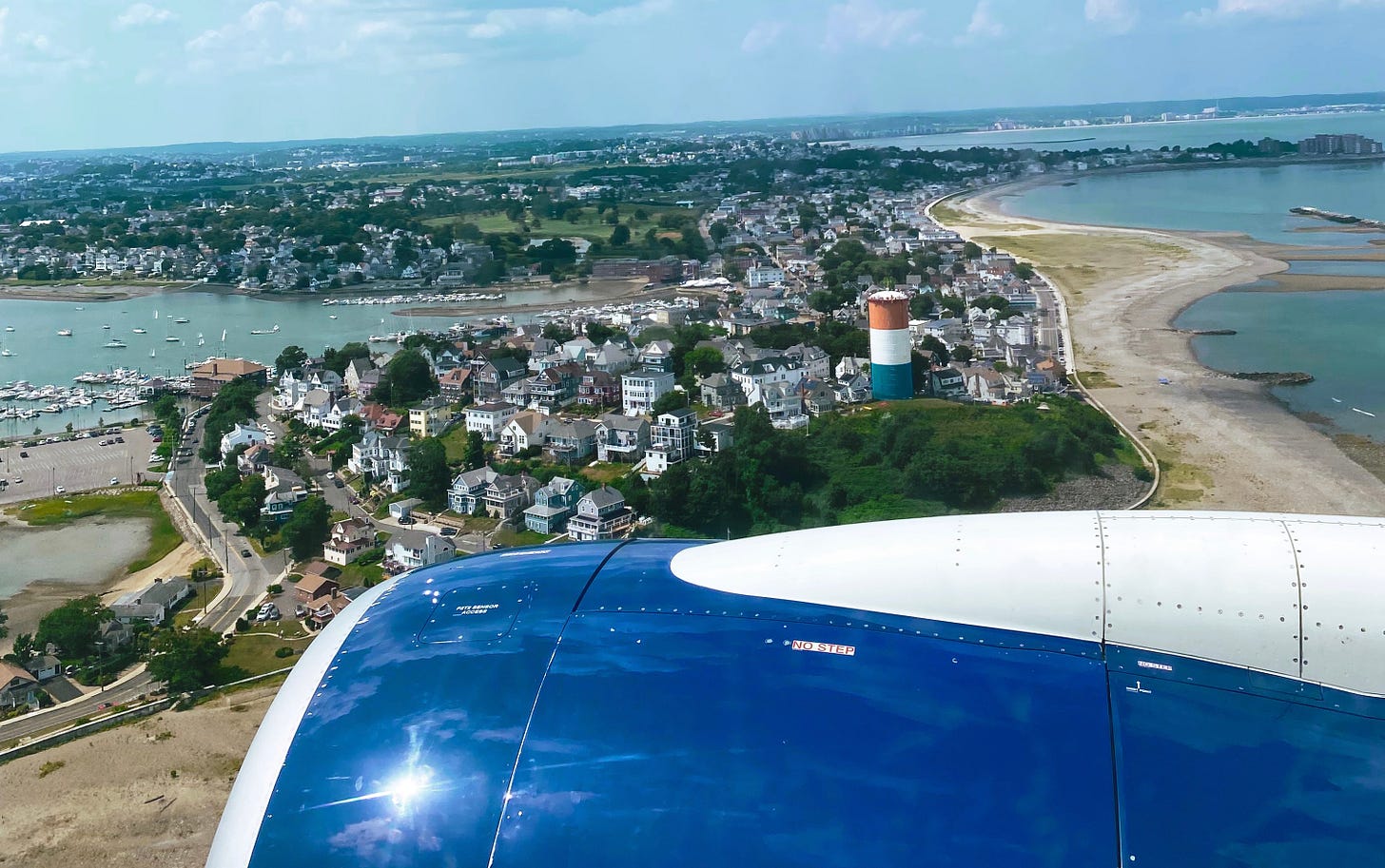
Flying over the coastline into Boston felt like a dream—the gentle gray skies, oceanfront homes, and sailboats scattered along the water. You know how people warn you not to build things up too much in your head for fear you’ll end up disappointing yourself? Moments like this remind me why we take that risk. When reality outshines every expectation. When you’re so happy you’re almost sad. I’ve since learned that it’s called the “golden hour feeling,” and the best way I can describe it is the ache of being fully present in a moment you start to miss before it’s even over. That was the prologue to my trip.
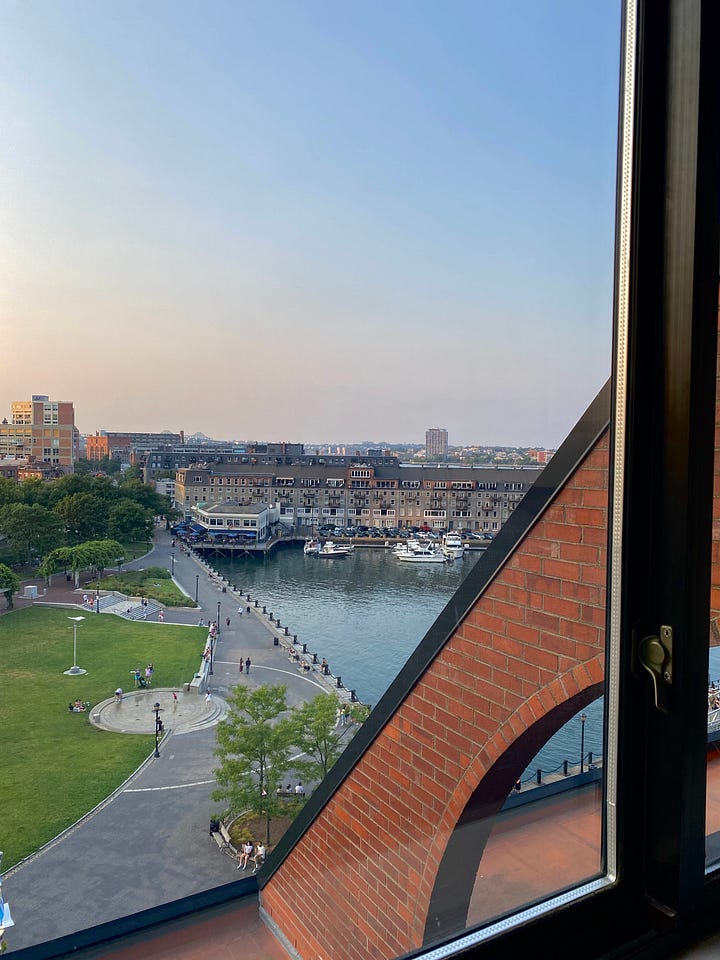

We stayed at the Boston Marriott Long Wharf, and if you’re looking for a place to stay in the area, I can’t recommend it enough. It’s a beautiful, upscale flagship property, perfectly located and overlooking Boston Harbor, just steps from Quincy Market and the New England Aquarium. That first evening, I indulged in what would become a ritual: a perfectly buttered, impossibly fresh lobster roll delivered right to the room, accompanied by a wedge of lemon that added the perfect touch of brightness. It set the tone for the rest of the stay—decadent, effortless, and unmistakably New England. The following day, we were treated to one of the best full American breakfasts I’ve ever had, served in their M Club Lounge. The very definition of a good morning.
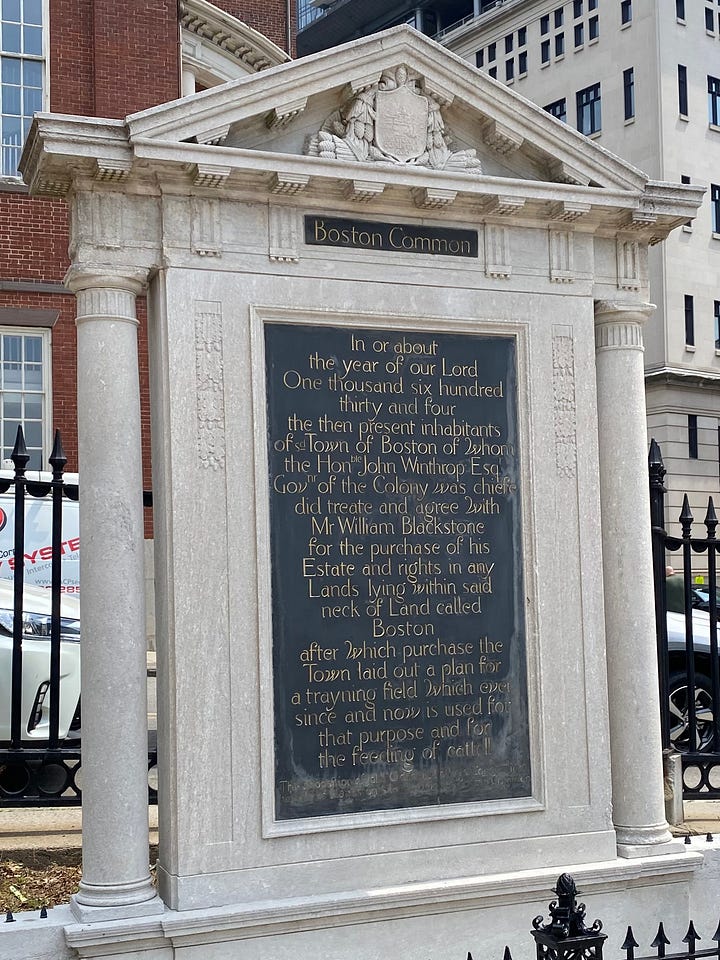

We set out on a self-guided tour of the Freedom Trail. We enjoy doing things our own way, at our own pace. Personally, I’m a slow person—a slow walker, slow reader, slow eater. I like to savor and enjoy the moment, take my time, and soak in what’s around me. And in Boston, there’s a lot to soak in.
What should usually take only two hours ended up taking us the entire day. I’d like to say it was because of an unexpected afternoon downpour that forced us back to the hotel for a hiatus to dry off and wait it out—but honestly, it was mostly because there were just so many (welcome) distractions along the way.
The Boston Athenaeum—a unique mix of library, museum, and cultural center—was one of them. It gave us a refreshing reprieve from the noisy, sweltering heat outside. As the oldest private library in the U.S., it’s a visual treasure trove for bibliophiles, art lovers, and novice historians. The interior feels very French-meets-Mediterranean, and if not for the Revolutionary busts, I might have forgotten I was in Boston. (The antique grandfather clocks are the cherry on top.)
We enjoyed our own Scenes from an Italian Restaurant over dinner at Limoncello, an authentic Italian spot in the heart of Little Italy (Boston’s historic North End). The encore was a complimentary limoncello—my first (and probably last) time trying the classic Italian lemon liqueur. Afterward, determined to finish the Freedom Trail in one day, we continued our journey with the USS Constitution.
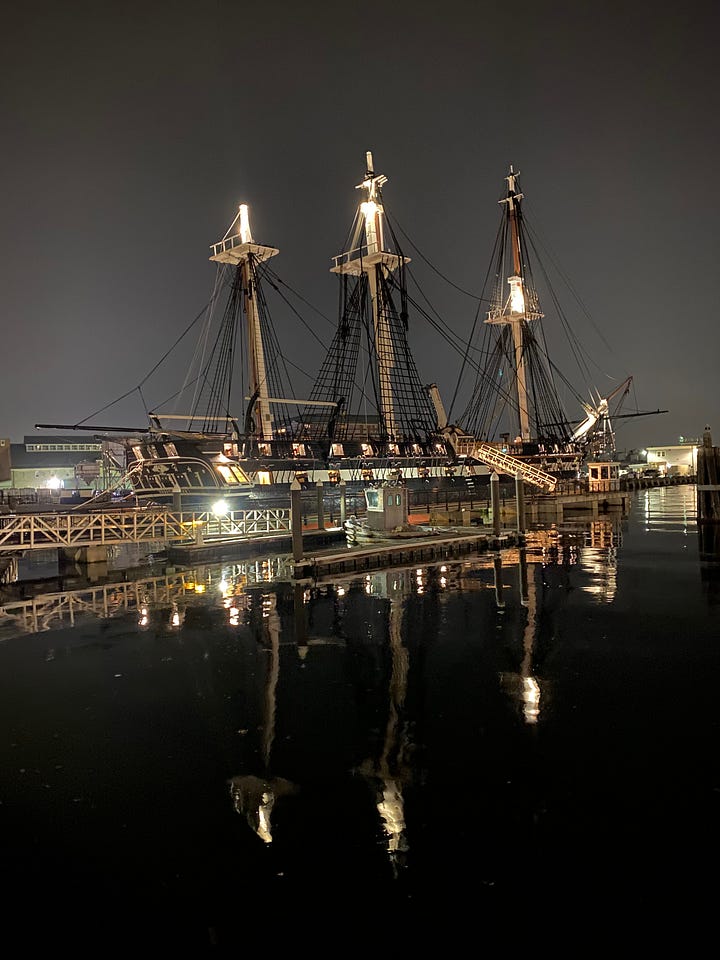
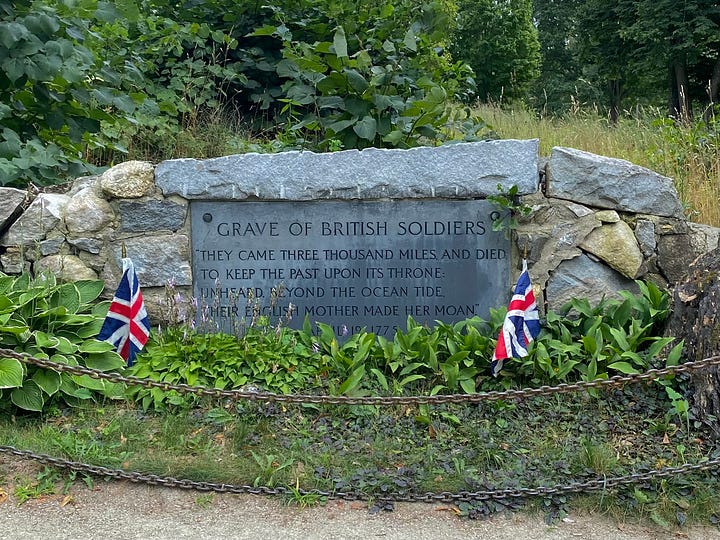
My fiancé has family in Boston, so we were able to meet up with them at Minute Man National Historical Park in Lexington and Concord. We walked the Battle Road Trail, a five-mile path that retraces the route taken by British troops. Here, I found one of the most moving gravestone inscriptions I saw throughout the trip—and that’s saying something, considering the day before I stood before the resting places of legendary figures like John Hancock, Paul Revere, and Sam Adams.
"They came three thousand miles, and died, to keep the past upon its throne; unheard, beyond the ocean tide, their English mother made her moan."
I think this passage struck me so deeply because it condenses centuries of loss, distance, and historical irony into just four lines. These soldiers crossed the Atlantic to fight in a war that must have felt incredibly far removed from their own lives, all to uphold an outdated order. The mourning mother—whether a literal English mother or England itself—goes unheard and overlooked, a reminder of how grief is often ignored or unshared in the broader scheme of history and politics.
There’s a clear parallel to our modern world, where debates over tradition and progress continue, and behind every opposing side are real people carrying grief. Even today, soldiers are sent far from home to fight for political goals they may barely understand. Ultimately, this is the tragedy of imperialism.


One figure who especially stands out to me is John Quincy Adams, probably one of my favorite Americans in history. I admire him as a diplomatic prodigy, a committed abolitionist, and a true public servant—literally serving until his death on the House floor. So we made a point of visiting Adams National Historical Park in Quincy, Massachusetts. We wandered the garden of The Old House at Peacefield, visited United First Parish Church (the resting place of two U.S. presidents and their First Ladies: John Adams, John Quincy Adams, Abigail Adams, and Louisa Catherine Adams), and toured the birthplace of John Adams.
Abigail Adams’ Remember the Ladies is easily one of my favorite letters from the colonial era. As one of the earliest recorded calls for women’s rights in American history, it proves a preexisting awareness of gender and social inequality—a reminder that the fight for justice and inclusion began alongside America’s founding.
There’s something about standing in the heart of colonial America while watching the Olympic Games that stirs a deep sense of patriotism. Not in the cliché sense—it wasn’t pride, though the two are often confused. It’s something more reflective: a love and devotion to your country that manifests as a sense of responsibility and a commitment to holding a critical view that doesn’t reject but engages; to believe in the potential to marry promise and reality. Which, to me, is an idea that feels uniquely Boston, one of the few places in this country that doesn’t hide its past but confronts it—often uncomfortably.
Coastlines: Maine
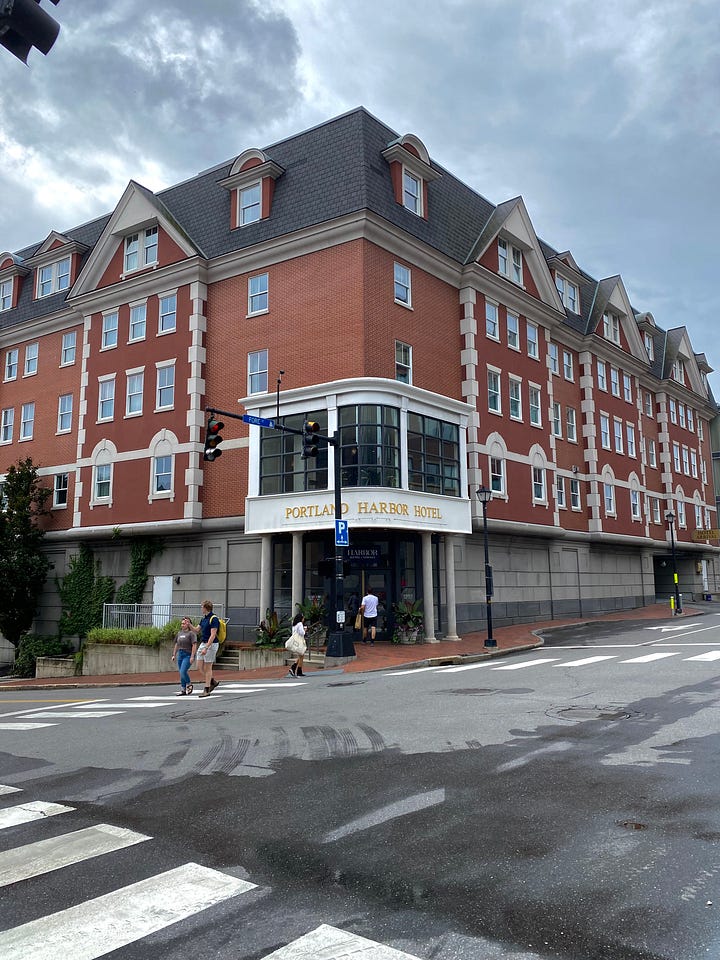

We stayed at the Portland Harbor Hotel, a cozy yet luxurious Four Diamond hotel nestled in the heart of Maine’s historic Old Port district. Adjacent to the harbor, we spent slow mornings enjoying room service breakfasts while watching the Olympic Games and listening to the seagulls and rhythmic pitter-patter of rain through our half-open window. Summer isn't a season here, but a time. Mornings feel like misty spring, noon brings the heat of summer, and evenings slip into a chilly autumn. To me, this was the first time I truly experienced luxury—not in the material sense, but the luxury of life itself. How rich fleeting moments like this can be.
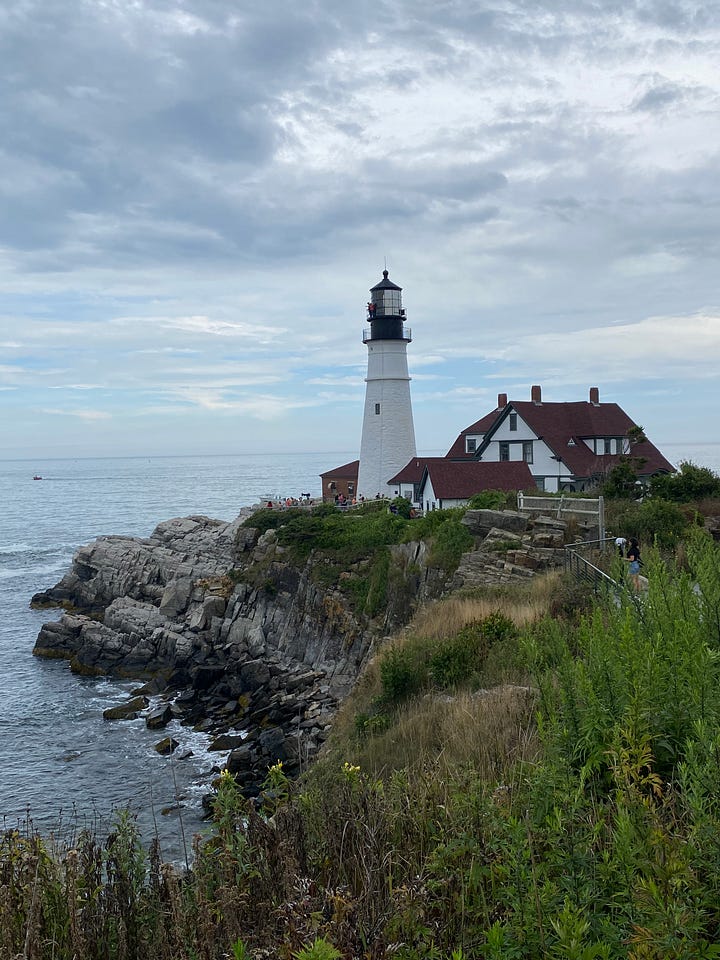
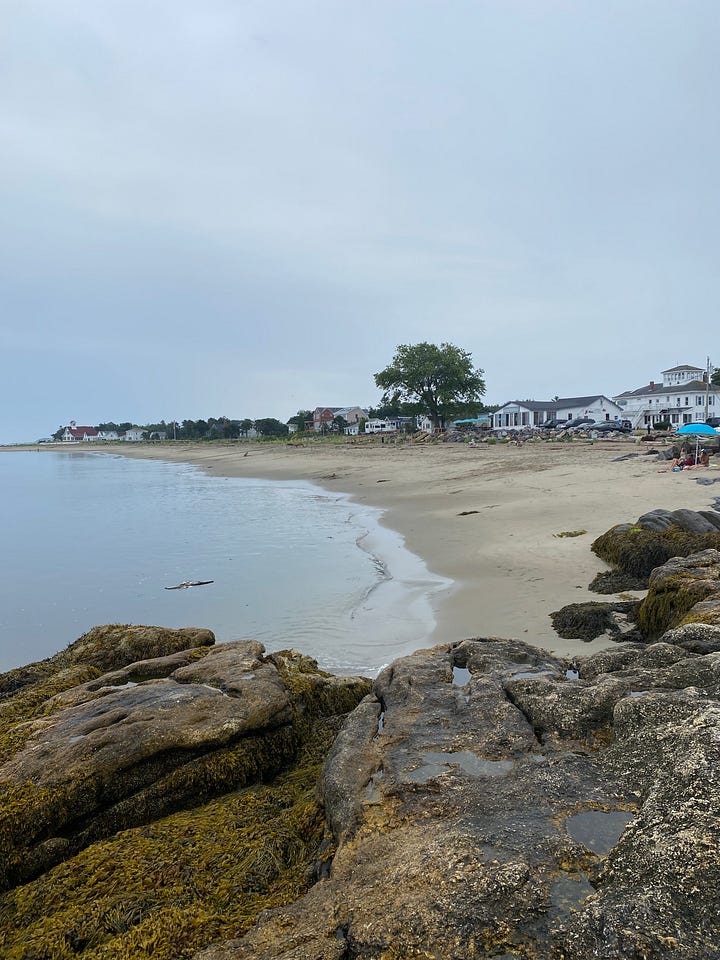
We visited the Portland Head Light in Cape Elizabeth, Maine’s oldest lighthouse. (Commissioned by George Washington and dedicated to Marquis de Lafayette.) And while eating the best lobster roll of the entire trip (and my life), I appreciated all the people around me, caught up in their own moments and making their own memories: tasting gelato for the first time, savoring fresh shellfish, families on vacation, strangers offering to take pictures for each other, little kids muddy from the shoreline.
An hour south lies Popham Beach in Phippsburg—a long, windswept stretch of sand that curves gently along the Atlantic and runs nearly three miles from Fort Popham at the mouth of the Kennebec River toward the mouth of the Morse River. Once home to the short-lived Popham Colony, founded in 1607, it was the first organized English attempt to settle in New England. The colony lasted only 14 months before fading into history, but it helped lay the groundwork for later expeditions like the Pilgrims’ arrival in 1620.
The overcast sky and moody waves felt honest and grounding, and every beach we stood on felt like a secret. There’s something about a gloomy coastline that seems nostalgic. It reminds me of handwritten letters, rainy day walks, and bittersweet goodbyes, with the rolling mist and muted tones capturing a melancholic beauty of cinematic quality.
Under my feet, I felt both the history and future of this shore. Standing there in that moment, I could sense the edge of a forgotten almost-beginning and thought about how history isn’t just about success. We tend to celebrate what endured, but there’s a certain beauty in what didn’t. Within that same space, I felt a sense of the future. I walked along the beach with my fiancé, and he held my seashells as I gathered more. I imagined one day showing my daughter the periwinkles, or watching for seals together along the rocks. It was like I was standing in the past, the present, and the future all at once. This is when I fell in love with Maine.
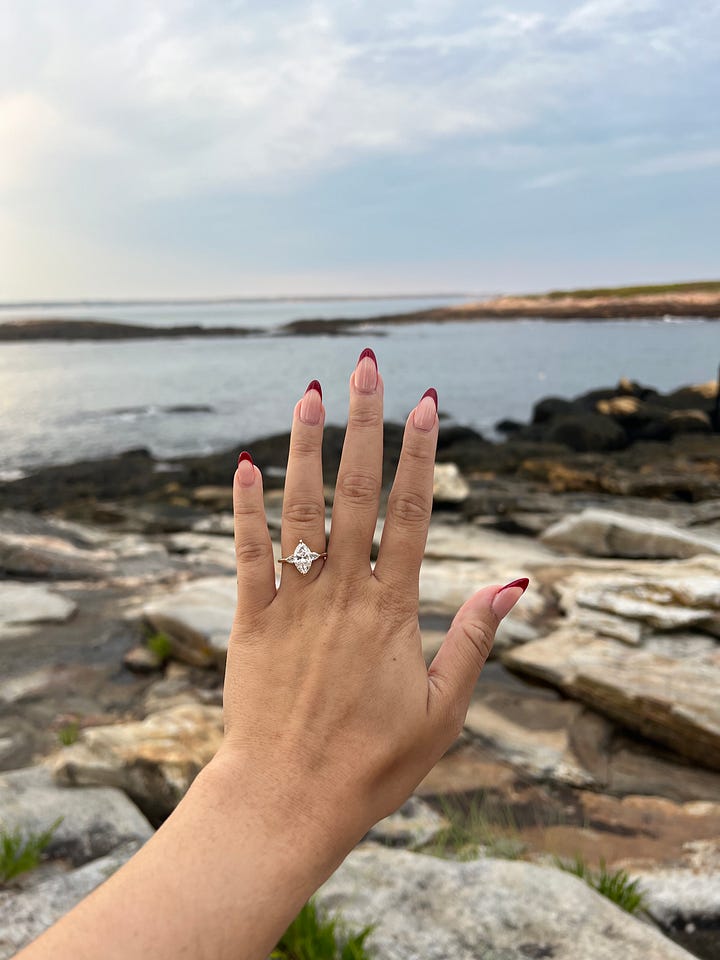

Near the mouth of the Kennebec River and the Gulf of Maine, Georgetown Island rests on the edge of the Atlantic Ocean. This is where my fiancé proposed to me—a moment that beautifully blended past and present. Just across the river from the historic Popham Colony, the island’s rugged, windswept charm featured rocky coves and quiet beaches. This place, touched by the same air, ocean, and sky that the first people and early settlers once breathed, held in that moment, a continuity that makes you feel connected to something far greater.
The downpour that serendipitously began just moments after our engagement turned into a thunderstorm during our drive back to Portland, and we arrived at Central Provisions (arguably the best restaurant I’ve experienced on the East Coast) where they were expecting us with champagne and intimate seating at the Chef’s Counter. As a hyper-independent woman, being surprised with pre-organized plans felt like a niche kind of love language. I hadn’t planned a single part, not even a tiny detail, of the entire trip, and it was so incredibly healing.


The epilogue of the night culminated with the final plate of our four-course meal: smoked carrots with whipped goat cheese and pistachio-honey vinaigrette. With the first bite, we looked at each other, eyes wide in shock. The sweetness, deepened by smoke, gave way to a bright, savory flavor that was immediately softened by the cream. Entrée or dessert? Who knows. But if happily ever after had a taste, surely this would be it.
Outside, the darkness had lifted, and the pier now had a dim glow from neon signs and streetlights. On our way back to the hotel, we paused for one final distraction: a foggy dock surrounded by blurred boats. We crept out onto the deck, and with each step, it felt like we were being swallowed by a thick, dense cloud. And though it would usually make me uneasy, I felt like dancing. There was no music, but my fiancé, always one to indulge me, led me in a slow dance. Not what you’d expect, but perfectly fitting for a place earthy, raw, and a little wild—like Maine itself.
From everything I experienced, Maine held a unique energy—maybe a bit romanticized, but that’s part of its charm. A place where memory and anticipation, love and loss, harshness and beauty, are layered deeply over time. So many feelings linger in the air, making it rich and thick, so that you can almost sense them wherever you go. The land and air carry their stories, and as you breathe in, you take in feelings that stay with you long after you leave.
P.S. Because no journey is complete without the meals that stay with you.
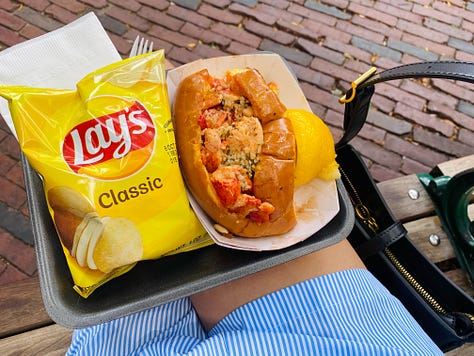


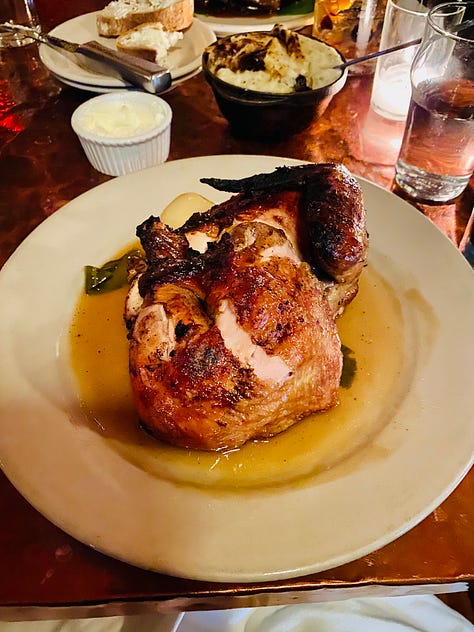






Finally got to read this and need you to know that the "if happily ever after had a taste, surely this would be it" did make me cry. I love this for you. I love your love story.